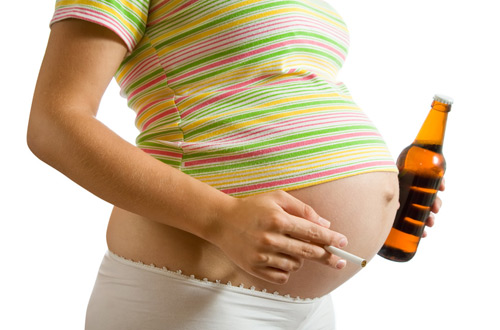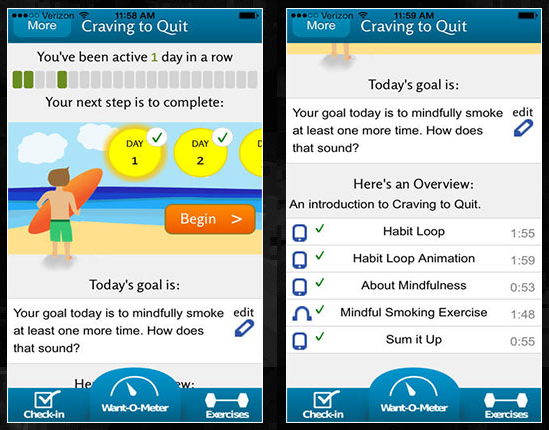Alcohol & Recreational Drugs

Whether found in beer, wine, wine-coolers or hard-liquor, it is a medical fact that large amounts of alcohol will harm your baby. Also, at critical times in fetal development, even small amounts of alcohol can cause serious problems. The Surgeon General of the United States, American College of Obstetricians and Gynecologists (ACOG) and the March of Dimes all agree that women should avoid all alcohol at all times during pregnancy.
Talk with your doctor or nurse-midwife with concerns about your lifestyle prior to or after becoming pregnant. If you're having trouble quitting drinking, please get help immediately.
Using the following drugs can have serious ill effects on your unborn baby.
- Methamphetamines (crystal-meth) and Cocaine can cause premature birth and irritability in newborn babies. Cocaine can cause heart attacks for mother, resulting in the death of her newborn.
- Heroin and other opiates can cause physical dependence in babies, which can be deadly.
- Marijuana (cannabis, grass, weed, pot,) can lead to premature birth and low birth-weight in a baby. Even when using the drug infrequently, Marijuana can cause problems because it is stored in the body long after use.
Important Note: There is no safe amount of these drugs. If this is an issue for you, please talk to your doctor or nurse-midwife, and seek-out counseling immediately.
Craving To Quit

Craving To Quit® is a 21 day mindfulness-based wellness program based on a successful smoking cessation curriculum developed and tested at Yale, and proven to be twice as effective as the leading quit smoking therapy, "Freedom from Smoking."
When you sign up, you'll get a mobile app to learn exercises to manage cravings, access to an online community to get support and share in others' success, and a video support group for live video chat with addictions experts to help you succeed.

Pregnancy and Addiction
Content below provided by Desert Hope Treatment - www.deserthopetreatment.com
Read more here
Pregnancy can be a time of hope and anticipation; however, this major life transition can also create a lot of stress in women and their loved ones. Physical discomfort, emotional strain, and financial difficulties can cause anxiety and increase the risk of substance abuse in pregnant women or teens. Drug and alcohol abuse are more common during pregnancy than the general public may realize, yet because of the social stigma of prenatal substance abuse and the potential for legal complications, many women are reluctant to seek help. Finding specialized recovery programs that provide safe, supportive, and confidential treatment for pregnant females and their unborn infants is a top priority.
Per the results of the 2013 National Survey on Drug Use and Health, the following data opens a window into the prevalence of drug abuse among females versus males:
- In the month prior to the survey, in the 12+ age group, current drug use among males was greater than among females (11.5 percent versus 7.3 percent).
- In terms of initiation into drug use, based on a 12-month survey review, 58.3 percent of the group of individuals who newly used drugs were female.
- Regarding alcohol consumption, in the 12+ age group, the percentage of males and females who were current drinkers was similar (57.1 percent versus 47.5 percent).
- Among Americans in the 12+ age group, males were more likely than females to drive under the influence (14.1 percent versus 7.9 percent).
With the exception of alcohol use, it appears that males are generally more at risk of drug use (and the attendant risky behaviors like DUI) than females. Of the females who abuse drugs, compared to males, they may have unique needs based on background circumstances. As the National Institute on Drug Abuse discusses, the following are some social factors that are likely to be prevalent among females who use drugs compared to males who engage in drug use:
- Lower level of educational attainment (i.e., not having completed high school)
- Greater rate of unemployment
- Health problems other than substance abuse
- Higher incidence of prior suicide attempts
- Greater likelihood of having experienced physical or sexual abuse.
An appreciation for the specific experiences a female may experience prior to or simultaneously with drug abuse can help to inform treatment responses. There is no one-size-fits-all approach to treatment, and research shows that sex and gender are relevant factors. In addition to sex-specific requirements females may have, pregnancy adds another layer of needs that will need to be addressed in treatment.
Pregnancy and Substance Abuse
The informational site Get the Facts provides data on the rates of substance abuse among pregnant females. The most recent data available was averaged over the years 2012-2013 and took into account different age groups as well as trimesters. The data collected reflects the following:
- To provide a benchmark, the research noted that 11.4 percent of non-pregnant females, age 15-44, were current users of illicit drugs.
- In the 15-44 age group, 5.4 percent of pregnant females were current users of illicit drugs.
- When trimesters are considered, in the 15-44 age group of pregnant females, the rate of current illicit drug use was lower in the third trimester compared to the first and second trimesters (2.4 percent, 9 percent, and 4.8 percent respectively).
- The age of the pregnant female was found to be a factor in the rate of current illicit drug use..
- In the 15-17 age group, 14.6 percent of those who were pregnant were current users of illicit drugs. In the 18-25 group, the rate was 8.6 percent. In the 26-44 age group, the rate dropped to 3.2 percent.
A pregnant female shares a placenta and umbilical cord with the fetus. From a biological standpoint, drugs impact body functions of both the fetus and the mother. The harm that may result from drug abuse depends on different contributing factors, including the type of drugs present, the point in pregnancy during which the drug use commenced, and the frequency of use.
As pregnancy is a unique health condition, the very fact of being with child can cause biological changes that make some drugs more harmful to the mother’s body and the fetus by extension. Further, fetuses have their own unique biological status. A fetus is highly sensitive to drugs and cannot eliminate them with the same proficiency as the mother. As a result, drugs can reach toxic levels in the body of a fetus in addition to causing a host of other health problems.
Effects of Drugs on Mother and Baby
During pregnancy, the placenta allows the delivery of oxygen and nutrients from the mother to the fetus through the exchange of blood. Any substance that is carried through the mother’s blood, including alcohol, illegal drugs, or prescription medications, can potentially affect the fetus. Substance abuse may harm the fetus in one or more ways:
- By causing complications with pregnancy, such as the separation of the placenta from the uterus or premature contractions of the uterus
- By interfering with the delivery of oxygen or vital nutrients through the placenta
- By harming the fetus directly by restricting growth or interfering with normal development
- By causing spontaneous miscarriage, premature delivery, or fetal death
 PREGNANCY
PREGNANCY  GIVING BIRTH
GIVING BIRTH  BABY CARE
BABY CARE  HEALTH & SAFETY
HEALTH & SAFETY  FUN STUFF
FUN STUFF  FAMILY
FAMILY 